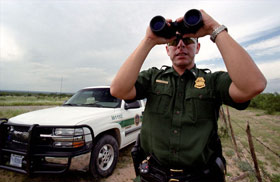 |
 |
 |
 News from Around the Americas | May 2005 News from Around the Americas | May 2005  
U.S. Report: Migrant Traffickers Forcing People Into Slavery
 Wire services Wire services


| | Each year U.S. Border Patrol agents catch and return many thousands of undocumented migrants back to the Mexican side of the border. Eagle Pass, Texas, USA |
Migrant traffickers are using the increasingly large flow of undocumented migrants into the United States to selectively enslave some of those workers, often as prostitutes or field hands, a U.S. Justice Department anti-slavery prosecutor said Monday.

Traffickers' "safe houses" homes where migrants are held pending payment of smugglers' fees not only are becoming more common in U.S. border states, but also now sometimes involve more than a few days of captivity.

The prolonged captivity is contributing to more than 16,000 estimated cases of slavery in the United States each year, U.S. Justice Department attorney Lou DeBaca told reporters in Mexico City, where he is looking to increase cooperation with Mexican officials in prosecuting such cases.

The 16,000 figure represents enslaved migrants from all over the world, but "a very large percentage of those" are Mexicans, DeBaca said.

He explained how regular migrant smuggling "can ripen into a slavery situation."

"There's such a large movement of people north, that it's easy to move people within that stream to enslave them as well," he said. "You can slip people into the migrant stream, fully intending to enslave them, (though) they might not know it."

DeBaca described one recent case in which police raided a group of trailers in Texas used as safe-houses by migrant traffickers. They found four Mexican women who had been forced to serve there for months as concubines.

"The four were held as slaves to serve as concubines for the alien smugglers, to cook, clean, and then at night be raped by the alien smugglers," DeBaca said.

"Those women thought they were going north like any other women but alien smugglers kind of plucked them out and held them over the long term," he said, noting that many such cases probably go unnoticed.

"If we had not been thinking about trafficking, we would have simply said 'there's a safe house with a bunch of hostages,' " he said of the 2003 case.

DeBaca, the anti-slavery coordinator for the U.S. Justice Department's human rights division, said cooperation with victims and Mexican prosecutors is key.

He noted that between 100 and 150 slavery victims have testified against migrant smugglers in the United States, but are now afraid to return to their native Mexico because of fear from the smugglers' rings, which tend to have operations on both sides of the border.

"The victims are afraid that they or their families may be hurt if they were to come back," DeBaca said. "We want to work with the Mexican government to bring traffickers to justice not just in the United States, but to be able to get all sides of these organizations."

"The only way we are going to put them out of business and make it so the victims feel safe is to arrest everybody in both countries."

He said victims who cooperate with prosecutors in the United States are often allowed to stay in the country, even if they are undocumented migrants.

"If somebody is a victim, we'll be able to keep them in the United States ... get them welfare, doctors," DeBaca said. "But people tend not to know that, so they suffer in silence."

Rules that are increasingly making local police enforce U.S. federal immigration laws may hurt the effort.

"Many of the local police have mentioned that the way their superiors have interpreted those laws, have prevented them from going into the immigrant communities and actually helping those communities," DeBaca said. | 
 | |
 |



